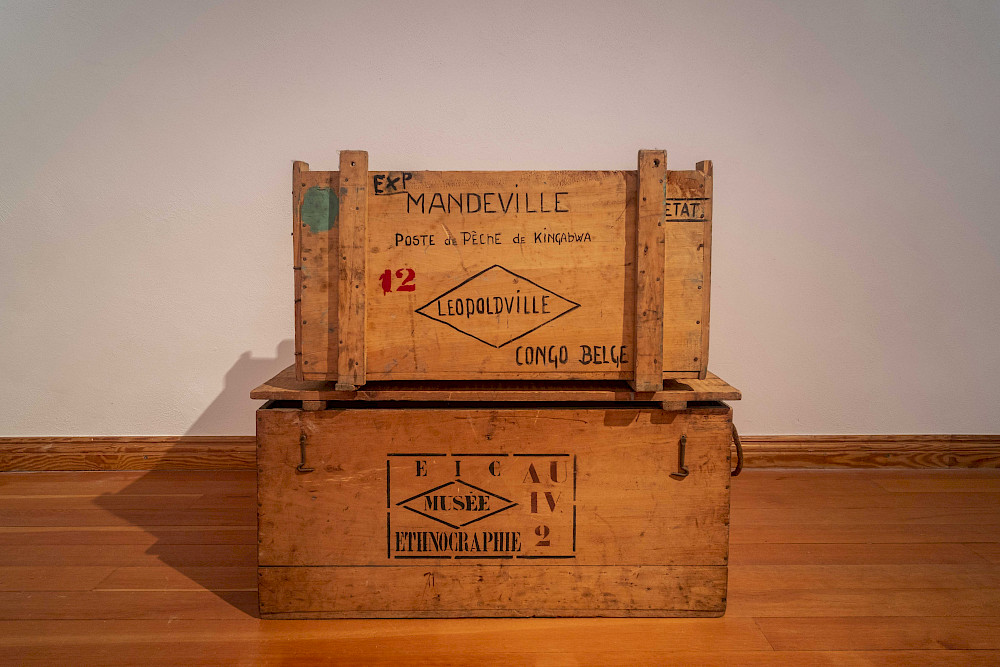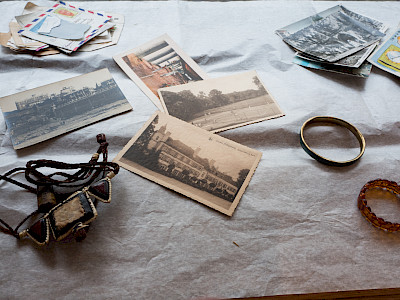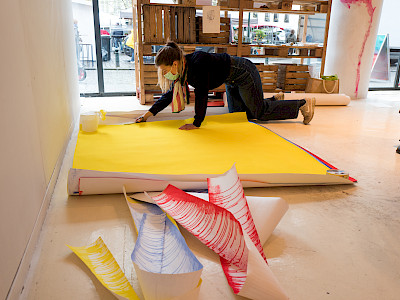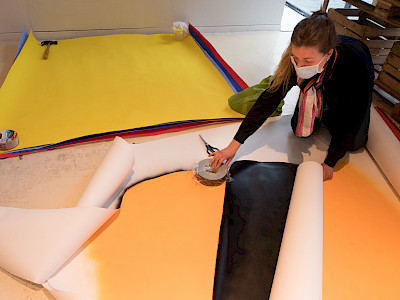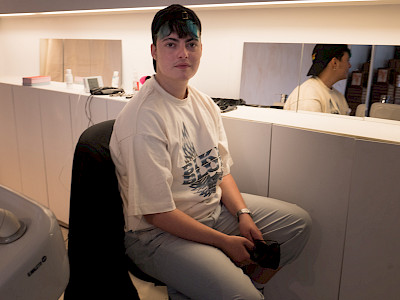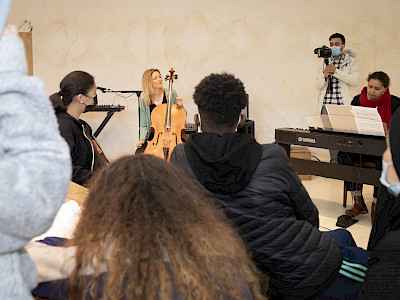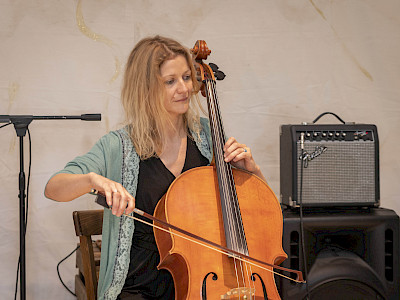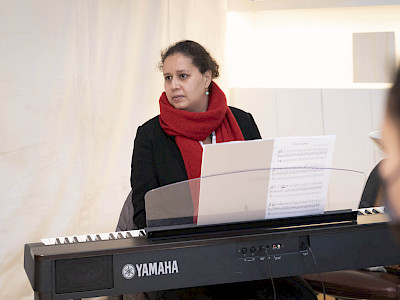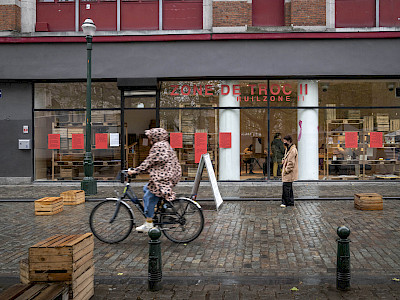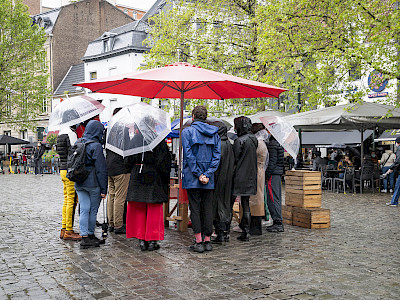08.05, 09.05, 12 — 16.05, 19 — 23.05, 26 — 30.05.2021
Pélagie Gbaguidi Brussels
Zone de Troc II
performative installation — premiere
Place Sainte-Catherine 45 Sint-Katelijneplein / Marché place Sainte-Catherine/Sint-Katelijneplein markt
Free entrance | Marché sans Objets is in open air
In Zone de Troc, Pélagie Gbaguidi opens up a participative space in which visitors can deposit or take away objects, stories, drawings, secrets and letters. Zone de Troc – a barter-zone – dreams up alternative exchanges that can take place during the economic crisis that is sure to follow the Covid-19 pandemic. She also revives the possibility of interactions with others, particularly strangers, that the pandemic has weakened or restructured to adhere to a principle of necessary isolation. The venue – a former hairdresser’s – becomes an incubator for regenerating an ecology of relationships and a new type of economy, using strategies to overturn the established order. Over a period of three weeks, a hairdresser, musicians and a tarot card reader will take turns meeting the public, and once a week an outdoor market-without-objects will also be held. For many years now, Pélagie Gbaguidi has created forms of productions in her artistic practice that contribute to metamorphoses in society. Zone de Troc is part of a reflection on the exchange of useful and symbolic goods that have been liberated from a liberal, monetised economy.
Protocol
Visitors are invited to come to Zone de Troc with a personal object and a story, in a spirit of gifting, exchange and generosity. The stories can also be written on the spot in registers on the installed tables. In exchange, the visitor will be able to leave with another object of their choice (that another person will have deposited). All these objects and narrative sources will constitute a collective biology of the city and will be put into circulation during the festival, read, diffused and exposed in the space.
Characteristics of the object:
- Rather a non-utilitarian object of small-medium size
- An emotionally charged, non-commercial object.
The value of the exchange lies in the feeling of generosity and collective sharing. The object of exchange is presented as an object that one has loved and that one would like to leave behind for a collective effort to create a sustainable society project.
Fars Coiffure
08 — 16.05, 13:00 — 19:00
Music sessions with Globe Aroma
19.05, 12:00 — 15:00, Naïl Sumbul
19.05, 16:00 — 19:00, Gueladio Ba
20.05, 12:00 — 15:00, Junio Jocol
20.05, 16:00 — 19:00, Moune
21.05, 12:00 — 15:00, Naïl Sumbul
21.05, 16:00 — 19:00, Juliette Lacroix and Docteur C.
22.05, 12:00 — 15:00, Juliette Lacroix and Docteur C.
22.05, 16:00 — 19:00, Moune
23.05, 12:00 — 15:00, Junio Jocol
23.05, 16:00 — 19:00, Gueladio Ba
Seaweed reading by Filip Van Dingenen
26.05, 12:00 — 15:00
27.05, 16:00 — 19:00
28.05, 12:00 — 15:00
29.05, 16:00 — 19:00
30.05, 12:00 — 15:00
Tarot reading by Celia Lutangu
26.05, 16:00 — 19:00
27.05, 12:00 — 15:00
28.05, 16:00 — 19:00
29.05, 12:00 — 15:00
30.05, 16:00 — 19:00
See also: Bring your kids
Stories to delay the end of the world
Pélagie Gbaguidi in conversation with Lotte Arndt
For Kunstenfestivaldesarts 2021, you are proposing a participatory space called Zone de Troc II [Barter Zone II]. What is the genesis of this project?
It started in 2019, during my research in Kipushi, in the Democratic Republic of Congo, as part of the Lubumbashi Biennale. There I met some women who work in the quarries in appalling conditions. They break stones against the ground, in the dust, and then sell them at totally ridiculous prices. I then came across a barter zone, an informal market located between the DRC and Zambia. Early in the morning, the vendors bring their merchandise, spread it out on the ground, and barter or sell it. I was astounded by the wisdom of these women who live in enormous precariousness and who, in a thrust for survival, to stave off hunger, saw a way of preserving social ties in the face of distress and tragedy, through bartering.
It was within the framework of this market that you engaged in a first barter, which connected this venue to future iterations.
For me, the encounter with this market generated a sensitive reflection on precariousness, both material and human, and on trader relations and alternatives to the capitalist economy. It was shortly afterwards, during a stroll through the streets of Lubumbashi, that I exchanged a brand new tarpaulin I had just acquired, for an old tarpaulin ground sheet which had obviously been used for a long time as work gear, with a girl and her mother. From then on, this tarp has served as a support; it has materially inscribed a link with the precarious economy of this place in the continuation of the project.
From this initial experience, you translated and adapted Zone de Troc in different contexts, always careful to look after the connections between those contexts, which are sometimes far from one another.
Zone de Troc is an extension of my research on the forms of visibility of trauma, and the modes of production involved in the metamorphoses of society. This issue is grafted onto different contexts, and activates specific but related problematics. Subsequently, I examined the notion of donation. And that led me to connect this gesture to contexts that broaden the matter of the extraction and production of precariousness through colonisation and global capitalism – such as that of the restitution of African artefacts to their creators. A very significant prick of conscience occurred in Lubumbashi, a city hollowed out of its wealth on many levels. I see a connection between the plunder of resources and culture. And then the work took shape, with a first chapter developed under the title Quand les girafes demandent une sépulture [When giraffes ask for a buria], at the Berlin Biennale in 2020, in collaboration with Lisette Lagnodo and the curatorial team. Berlin is the city that in 1884-1885 hosted the international conference that established the rights of merchants from the colonising nations, and which was duly dubbed the Congo Conference.
The project takes very different forms, involving material components and relational changes. Where is the agency of the work?
Zone de Troc is a therapeutic sculpture. It’s a participatory space that engages a process of personal and collective transformation. Through fiction, it proposes becoming involved in an imaginary scenario that attempts to provide ideas for regenerating a relationship ethic, a new form of economy that involves strategies of diversion from the established order.
What issues is Zone de Troc actually working on, from one context to another?
We live in a time of a precariousness of social bonding, of relationships. The city is destabilised. The habitat is deconstructed. Faced with the scale of upheavals that are underway, we must look for other forms of connection. I ask myself how we can inhabit the link. We’ll need to reflect on what we can learn from these affected zones, from these ways of resisting predation, even in its extreme forms. The barter zone seems to me to be an alternative to rethinking our link to the living.
How do you think Zone de Troc specifically applies to Brussels?
My work is about transforming reality. The spaces I’m offering are open, they want to be places of friction, connection points for links. This is why I’m starting with an existing hairdressing salon in Place Sainte-Catherine / Sint-Katelijneplein in Brussels – live places with which we must negotiate and take into account what is already underway. I’m driven by the narrative dimension of reality. Zone de Troc seeks to stimulate an active utopia, where the inhabitants generate encounters in order to “delay the end of the world”, as Ailton Krenak aptly writes. There is an urgent need for us to look at the fate of the world together. The precariousness of the bond is visible in numerous locations – we must confront it. From this affected reality, we can ask ourselves how to break with dystopia in order to heal this damaged land.
Presentation: Kunstenfestivaldesarts-CENTRALE for contemporary art
Conception, realisation: Pélagie Gbaguidi | Dramaturgy: Dominique Pattuelli | Architect: Lydia Antoniou | Artistic coordinator: Katerina Nikou | With the participation of: Filip Van Dingenen, Katerina Nikou, Fars Coiffure, Globe Aroma, Celia Lutangu, Yi Zhang, Marianne Borremans, Alexandre Dewez, Ophélie Mac, Aurélien Leforestier, Dominique Pattuelli, Care and Queer, Lietje Bauwens and Wouter De Raeve (431) | Commissioned and produced by Kunsfenstivaldesarts | Coproduction: CIFAS - Centre international de Formation en Arts du Spectacle | With the support of COCOF & CENTRALE for contemporary art
